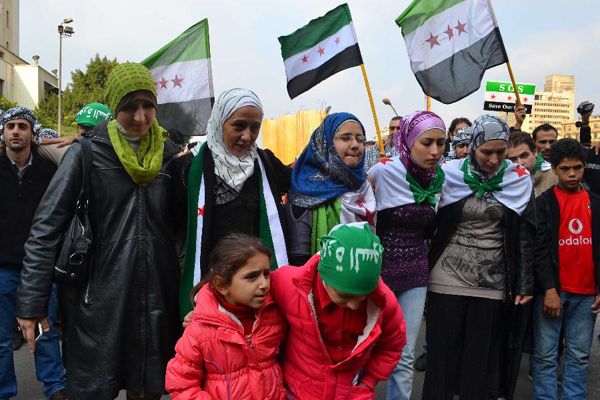Syrian opposition calls for national unity gov't
 0 Comment(s)
0 Comment(s) Print
Print E-mail
Xinhua, December 12, 2011
E-mail
Xinhua, December 12, 2011
A Syrian opposition front at home called for forming a national unity government as the sole solution to end the nearly nine-month-old crisis, as the ongoing violence in central Homs region is ramping up unabatedly.
|
|
|
Syrian protestors shout slogans during a protest against Syria's President Bashar al-Assad in front of the Arab League headquarters in Cairo, Egypt, on Dec. 6, 2011. [Xinhua photo] |
"There is no substitute for a national unity government, whose main task is to combine all the honorable spectra of the Syrians to defend the homeland and the national unity in the face of all conspirators whether they are hiding within the regime or publicly announcing their attachments with the West," the Popular Front for Change and Liberation (PFCL) said in a press conference Sunday.
"Such government is capable of playing down the rift and building trust between the state and all spectra in the community, " it said, calling on the Syrian regime to deal seriously and swiftly with "this demand."
It also urged the "national opposition" to react positively to the demand of national unity government "because the homeland is more important than who's with and who's against."
Adel Nai'sseh, member of the PFCL, made it clear that "under these circumstances, I think what we are calling for is the only substantive outlet to the crisis and any other solutions might complicate the situation and prolong the current crisis at the expense of the Syrian blood.
Commenting on the broad-based opposition's calls for a general strike in Syria, Qadri Jamil, head of the PFCL, said such calls would reverberate negatively at the livelihood of the Syrian people and won't hurt the regime.
He lashed out at Burhan Ghalioun, the leader of Syrian National Council (SNC), for the concessions that he had offered to the West to assume power.
In an attempt to placate Western countries, Ghalioun, head of the fledgling Turkey-based SNC, told the Wall Street Journal that the council will "cut Syria's relations with Iran, the Lebanese Hezbollah and the Islamic Hamas movement once it assumes power in Syria."
The opposition calls for general strike were met with deaf ears among Syrians particularly in the heart of the capital Damascus as the shops were all opened and the daily life was normal.
However, some suburbs of Damascus on Sunday, particularly Harasta, a hotbed of dissent and in some cases armed confrontation with government forces, witnessed a general strike as shops were all closed, a witness said.
A resident of Harasta told Xinhua that some shops were forcibly closed in that area out of fear of reprisal from armed thugs that threatened retribution if shop owners didn't comply with the strike.
Syria has blamed armed thugs paid by the West and their backers in some Arab countries for fueling sectarian rivalries in a country that constitutes of a complex mosaic of sects and ethnicities.
Earlier in the day, private Al-Watan newspaper said that the central province of Homs went through a "new bloody" day on Saturday as a number of militants and civilians were killed and some others were kidnapped.
The paper added that clashes have continued between army members and armed groups especially in the central province of Hama and the northern city of Idlib.
Quoting medics at Homs, al-Watan said at least 20 corpses were dumped in Homs streets.
Also, the paper said Syrian authorities have succeeded in releasing 15 people, including three women, who were recently kidnapped at al-Houla area in Homs, adding that 10 wanted gunmen have been arrested.
Clashes left three officers and two gunmen killed in Homs.
In Hama, Syrian Arab News Agency (SANA) said engineering units dismantled at least five explosive units.
On the other hand, the Doha-based al-Jazeera TV cited opposition activists as saying that about 14 Syrians were killed Sunday in a new wave of violence.
Syrian President Bashar al-Assad has recently said that about 1, 100 members of the armed forces were killed during the unrest, while the United Nations put the number of the upheaval's victims at 4,000.
In a related development, the Arab League (AL) foreign ministers will hold an extraordinary meeting at the end of this week to discuss the Syrian situation.
The AL's special ministerial committee following the Syrian situation will also convene to decide on the Arab response to Syria's recent positive stance toward the AL observer mission.
In a message sent by Syrian Foreign Minister Walid al-Moallem to AL chief Nabil al-Arabi earlier this week, Syria welcomed monitoring by observers, but proposed some minor amendments that would not affect the protocol's essence.
Syrian foreign ministry spokesman Jihad Makdissi has recently said the minor amendments included that the protocol should be signed in Damascus, and that all the decisions and sanctions against Syria should be considered "null and void once the two sides signed the protocol."
On Nov. 27, the pan-Arab body, which officially suspended Syria 's membership on Nov. 16, decided to immediately impose sanctions against Syria, as the violence-hit country failed to sign a protocol over the visit of an AL observer mission.







Go to Forum >>0 Comment(s)